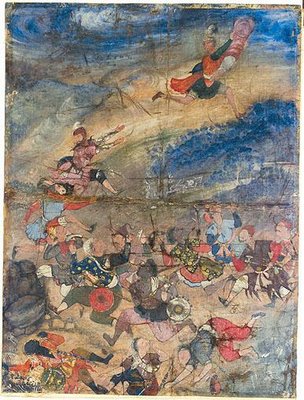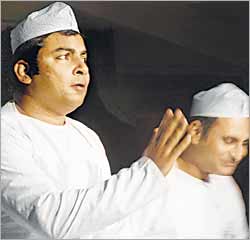
I initially read about "Dastangoi" in Time Out Mumbai, my source of knowledge for events in Mumbai. Then Dan Hussain posted an invite on the Caferati message board.
Exchanged a couple of mails with Dan in which he told me I didn't need to understand the language to enjoy the performance. I was a bit sceptical, but thought why not attend ? The performance at NCPA was free, so could leave at the interval if I could not make sense of it. Plus inlaws were in town & they love theatre and understand a fair amount of Urdu.
So the 6 of us bundled ourselves into the car at 4:15 to reach NCPA by 6:30.
The next 2 hours were completely spellbinding. As most people who know me would tell you, my knowledge of Hindi is recently acquired & I can barely manage the colloquial stuff, so I was wondering if I would be able to understand any of the proceedings. Inspite of Dan's assurances, my doubts persisted till Mahmood began to weave his tapestries.
Dastangoi is very difficult to describe. It needs to be experienced. But let me try to give you an idea of what to expect. Its a cross between a theatre performance & a poetry reading. The words are wonderfully descriptive and conjure visions in your head. The perfomers are seated but use expressions, gestures, tone of voice & myriad other techniques to transport you into a realm of fantasy consisting partly of "tilisms" (alternate worlds), aiyyaars, sorcerers & magicians.
"Dastangos were those who told ‘dastans’ (stories). Recounting tales of Amir Hamza, the Prophet Mohammed’s uncle, they told narratives of his battles with infidels, sorcerers and other pretenders to divinity.” says Farooqui.
"In the dastani worldview, good and bad are evenly matched, infinitely. When an evil sorcerer dies, a new one rises to replace him. When someone on the righteous side is killed, another one is quickly found to replace him. Hamza is the lead character, he is the Lord of the age."
"Dastangoyee is about four things: Razm — warfare, Bazm — assembly of singing, dancing and seducing, Tilism — magical effect or artefact created by the sorcerer, and Aiyyari — chicanery, trickery, disguise. The aiyyars, the tricksters, are employed by both sides."
If you would like to read more about the subject, do read
Mahmood's interview with Mumbai Mirror
Mahmood's interview with Mumbai Mirror
Mahmood's interview with Tehelka
If you would like to watch a performance, you are in luck. If you already caught the NCPA perfomance, then consider this the next couple of episodes.
Dastangoi: A Presentation of the Lost Form of Storytelling
(A Part of Katha Collage II)

The Sea of Eloquence – An Evening of Dastan-e-Amir Hamza
July 1 & 2, 2006 at 9:00 pm, Prithvi Theatre, Juhu, Mumbai
Tickets available at Prithvi on the day of performance itself.
The oral narration of Dastan-e-Amir Hamza was a popular past time in most parts of Central, Western and South Asia and North Africa since medieval times. Originally composed in Persian, the Dastan-e-Amir Hamza describes the battles of Amir Hamza, the Prophet Muhammad's Uncle, against infidels, sorcerers and other pretenders to divinity.
Until the beginning of the twentieth century, the Dastan-e-Amir Hamza was singularly successful in entertaining a whole range of people, from the commoners at chauks and nukkads to the elites in their palaces; it was performed at the steps of the Jama Masjid where Dastangos gathered. While their neglect as literature is inexcusable, they have been wholly obliterated from the canon of performing arts. As anecdotes of Mir Baqar Ali, the last known Dastango of Delhi, testify, their performances required an exceptional command over rhetoric, delivery, mimicry, ventriloquism and spontaneous composition.
The present performance of Dastangoi builds upon some recent shows that were enthusiastically received in the Capital. The performance consisted of portions of the best-known daftar, or chapter, of the 46 volume Dastan-e-Amir Hamza, the Tilism Hoshruba, the 'Enchantment that Steals away the Senses', which is itself in seven volumes.
The performances have come about as a result of a collaboration between S.R. Faruqi, the foremost living authority on these Dastans and the only person to possess a full set of all the 46 volumes, and the performers. Faced with neglect and systematic devaluation we now have very scanty evidence for the way in which these Dastans were compiled and performed. Even basic things such as movements, gesticulation, stage setting are wholly unknown. The current performance is therefore merely an exploration of an Art form which, astonishingly in a culture where poetry was regarded as the supreme art, was considered by some to be of a higher order than poetry itself. Dastangos were supposed to be a repository not just of language, common speech as well as literary, but also of social mores, craftsmanship, and all other forms of knowledge.
The Dastangos of old performed in an oral culture where memory, sound and directness were much prized. As modern actors we neither have skills to memorize whole daftars, nor the inventiveness to do spontaneous and extempore improvisations which are the hallmark of oral performances.
Mahmood Farooqui
New Delhi
Mahmood Farooqui is a self-trained actor and performer whose most recent foray into acting consisted of a role in Mahesh Dattani's English film, Mango Soufflé. Initiated into theatre as a schoolboy, and as stage manager, by Mohan Maharishi, former director of the National School of Drama, he directed several plays at school and college, and prepared for the final entrance workshop of the NSD, before founding his own amateur theatre group called Dastak Theatre. After completing his M Phil in Indian History from Cambridge University, Mahmood went to Mumbai and performed in IPTA's Aakhri Shama and the Company Theatre's Hindustani presentation of Rosencratz and Guildenstern are Dead. Earlier this year, he was given a Fellowship by Sarai, CSDS to work on the Dastan-e-Amir Hamza.

Danish Husain has done theatre with the best names in the country - Habib Tanvir, M.S. Sathyu, Barry John, Rajinder Nath, Sabina Mehta Jaitley, Aziz Quraishi, et al in a wide variety of roles. His latest assignments include a play called Raja by Rabindra Nath Tagore and a movie, Losing Gemma, by Granada Productions for a British TV Channel called ITV. He also performed at Bonn Theatre Festival in May 2006 as part of Habib Tanvir's Agra Bazaar troupe. Besides being an accomplished actor Danish is a poet and a writer, whose work has been published across a cross-section of media, including Tehelka and other journals. He is a member of few collaborative blogs and a writer's group called Wriyaz supported by the British Council. Danish holds a Master's degree in economics from the Delhi School of Economics and an MBA from the Faculty of Management Studies, University of Delhi.
Get to know the performers at
Mahmood Farooqui's Blog
Dan's poems & his Discontents
Dan's Proseonama








No comments:
Post a Comment